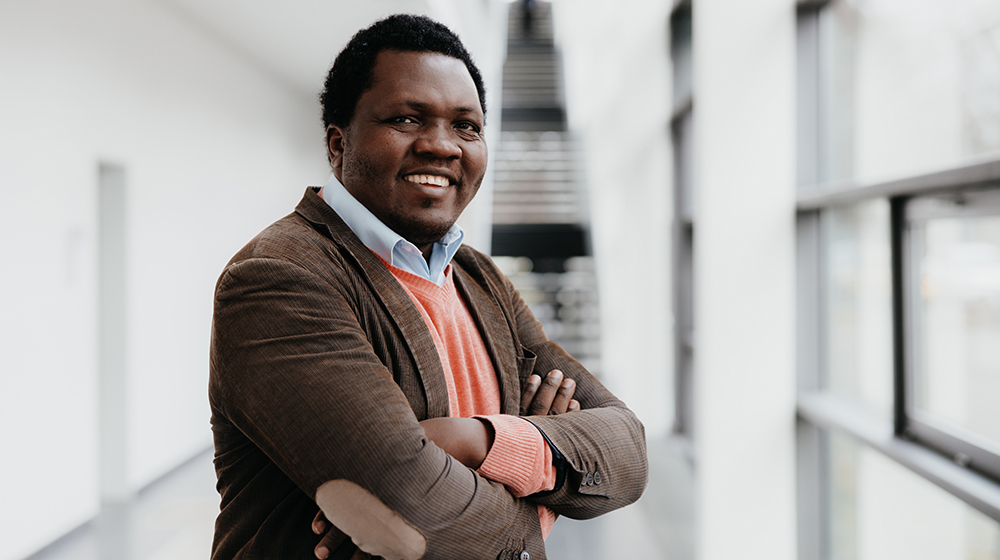
Scientists from all over the world keep coming to Otto von Guericke University Magdeburg thanks to an Alexander von Humboldt Fellowship. With its research fellowship, the Alexander von Humboldt Foundation supports postdocs and experienced scientists from all disciplines in their research projects in Germany. A fellowship from the Foundation is considered a high honor for both the recipient and the host. Currently, Prof. Dr. Michael Böcher from the Chair of Political Science with a focus on sustainable development is hosting Dr. Richard Sufo from Cameroon. Lisa Baaske spoke to the Humboldt Fellow about his research, his goals and what it means to him to be a Humboldtian.
What did you do before you came to the University of Magdeburg?
I was born in Cameroon where I grew up, studied and worked part of my life. I am a geographer at heart and I took my first steps in this discipline in the department of geography at the University of Dschang where I obtained my Master's degree. Then, after few years of professional experience in action research, I did my PhD thesis at Le Mans University in France, where I defended in 2019.
How did you get to the University of Magdeburg?
After a scientific stay at the University of Gottingen, I worked with the chair of Professor Krott Max, in particular with Dr. Ongolo Symphorien, with whom we published an article on knowledge transfer. This field of research is largely related to that of Prof. Dr. Michael Bocher who published a special issue with our article. We kept in touch and I asked him to support me in my project with the Humboldt Foundation. This is how I got the Humboldt foundation scholarship for a Postdoc in the chair of Political Science with a Focus on Sustainable Development at the University of Magdeburg. I will now be conducting research in Magdeburg for two years.
What does it mean to you to be a part of the Humboldt Family?
It is an immeasurable opportunity to be part of the Humboldt Family. It will allow me to gain research experience in political science, but also to build a strong research network.
What are you researching?
My research focuses on the scientific and indigenous knowledge produced and disseminated in the context of climate change. I am interested in the process of knowledge transfer through the RIU model in the context of large programs such as Central African Forest Initiative (CAFI), United Nations Climate Change (UNFCCC), and Green Climate Fund. The RIU model developed by Böcher and Krott (2016) offers an innovative approach to organizing knowledge transfer from research to policy and practice. It emphasizes the need for an integration phase to bridge the differences between academia and practice. Different types of non-academic allies are necessary to enable implementation of research findings into practice. My work aims to encourage stakeholders to consider all the available knowledge, but also to create an appropriate platform that would bring about change. Through my work, I would like to contribute to the success of projects to reduce greenhouse gas emissions and thus reduce global temperature rise.
What do you find fascinating about your field of research?
My field of research involves multi-level actors who are intertwined and who each fight for their own interests. The challenge is sometimes to bring politicians, scientists and civil society to the same table, but meeting all these stakeholders to exchange and produce results that can be used in decision-making is a daily joy. My training as a geographer and my experiences in forestry research and at the interface between research and action in the field have oriented me towards this rather fascinating field which considers humans and all the knowledge they possess. In this sense I consider that I feel useful to contribute at my modest level. I want to increase my competence in Political Analysis, to publish several scientific articles in order to acquire at the end of my postdoc a notoriety allowing me to continue in the international research.
What benefit do you hope from the research in the group of Professor Böcher?
I am sure that my stay in the research group of Prof. Dr. Michael Bocher will be a convivial moment that will give me the opportunity to learn more about the concepts and to become familiar with the members of the team. The RIU analysis model will be the main element that will allow me to build my knowledge transfer analysis frameworks, but also to carry out comparative analyses between two global forest basins: Central Africa and Southeast Asia (notably Indonesia and Vietnam).
What do you like most about the university and Magdeburg?
The working environment is very suitable and peaceful, and the colleagues are very friendly. This provides a framework for working in peace. Magdeburg is a clean and peaceful city. I really enjoyed the Christmas market which was very charming and cosmopolitan.
